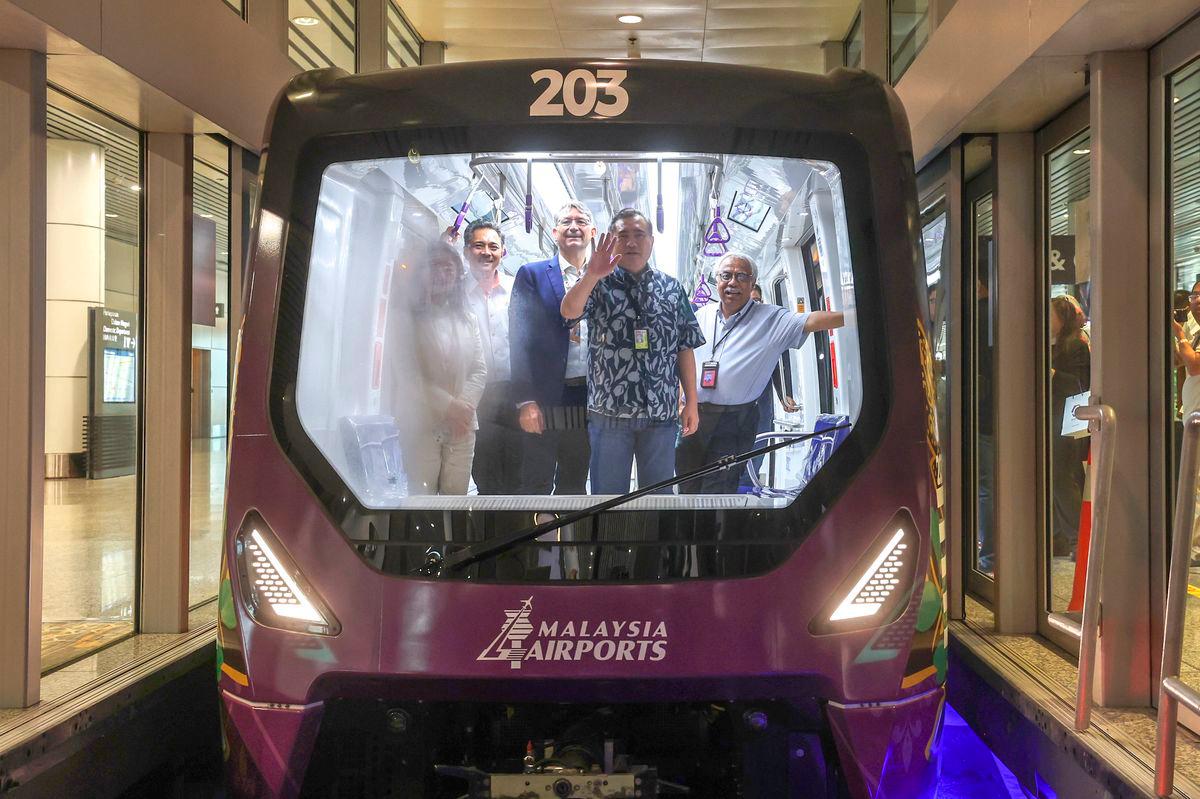SEPANG: The long-awaited Kuala Lumpur International Airport (KLIA) Aerotrain service will resume operations on July 1 at 10am, more than a year after it was suspended due to aging infrastructure and safety concerns.
Transport Minister Anthony Loke announced the reopening yesterday following a successful trial run and inspection at KLIA Terminal 1.
“We are now in the final phase of testing. Several more tests will be conducted in the coming days, including a major Emergency Response Plan (ERP) drill involving Malaysia Airports Holdings Berhad (MAHB) staff and emergency services,” he said after the media tour.
“If all goes smoothly, the Aerotrain service will resume as scheduled.”
Loke acknowledged the frustrations faced by travellers but stressed that safety must take precedence.
“Many Malaysians and international passengers have asked when the service would resume. I understand their concerns, but we could not compromise on safety,” he said.
“As much as I wanted the service to restart earlier, all necessary tests had to be completed and approved by the Land Public Transport Agency (APAD).”
Originally targeted for a Q1 2025 relaunch, the project was delayed to May, and eventually to July.
Loke confirmed the delay was due to extended safety testing and system fine-tuning, not any critical faults.
“We do not deny there was a delay. It was beyond our expectations.
“But as the technical regulator, the Transport Ministry must ensure the Aerotrain is safe before we allow it to carry passengers again.”
The upgraded Aerotrain system can carry 270 passengers per trip, consisting of three connected compartments with a capacity of 90 passengers each.
“Two train sets will operate simultaneously during peak hours, with a third train set on standby as backup,” Loke said.
“During non-peak or engineering hours — between midnight and 5am — only one train will operate to allow for maintenance.”
He said the Aerotrain is designed to offer a more seamless, comfortable, and efficient transit experience as part of ongoing efforts to elevate KLIA’s service standards.
Although the Aerotrain is returning, the shuttle bus service introduced during its suspension will remain in operation for now.
“Until the Aerotrain service fully stabilises, we will continue running the buses to ensure uninterrupted service,” Loke said.
The resumption comes at a pivotal time as Malaysia prepares to host a series of Asean meetings and summits, including a high-level event in the capital later this year.
“It also aligns with preparations for Visit Malaysia Year 2026, which is expected to see a surge in international arrivals,” Loke said.
“This upgrade is part of our broader plan to ensure KLIA remains a world-class gateway to Malaysia.
“We want to provide a positive first impression for international visitors.”
The project is being implemented under strict oversight from APAD, which required the system to undergo a rigorous validation process.
The first train was required to complete 2,000km of continuous fault-free operations, while the other two trains logged 1,000km each.
This testing ensures all three trains are fully commissioned and that the system’s built-in redundancy is ready for live operations.
MAHB managing director Datuk Mohd Izani Ghani said the airport is now in the final stretch of preparations.
“This includes testing our emergency response plan to ensure we are ready for any eventuality.
“Our volunteer employees are also participating in live trial runs to simulate passenger movement and help us fine-tune operations.
“It’s a system that requires seamless integration across multiple components, all of which must meet stringent safety and performance standards set by the regulator.”
He expressed gratitude to APAD and the Transport Ministry for their close oversight and support, and to contractor Alstom and its consortium partners for delivering the project safely and within budget.
“We look forward to commencing operations on 1 July, pending final approval by APAD and MOT,” he said.
The Aerotrain replacement project began in 2022 as part of a broader three-year infrastructure upgrade at KLIA.
The overhaul was deemed necessary after the original trains — in service since the airport’s opening in 1998 — suffered frequent breakdowns and declining reliability.









